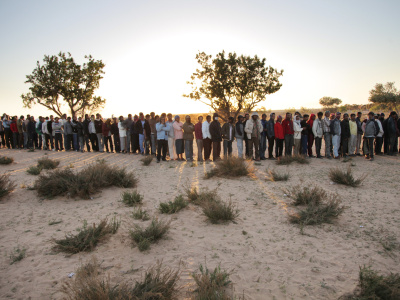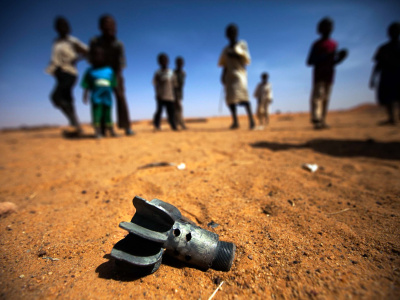
EU-Tunisia cooperation on migration: Conflicting agendas? – Blog 2
Our previous blog outlined the EU’s vision of migration management together with partners in North Africa, with the aim to stem and ultimately reduce the flow of irregular migrants through the Mediterranean. In this blog, which partly builds on a recent Carnegie publication, we take a closer look at the specific situation in Tunisia aiming to answer the following question: what challenges and opportunities are there for closer cooperation with Tunisia, as envisaged by European countries?
Currently, Tunisia does not represent a key country of origin or transit of irregular migrants to the EU. In 2016, only 0.5% of irregular migrants arriving in Europe through the Central Mediterranean route departed from Tunisia. Moreover, the number of Tunisians who cross irregularly to the EU has continuously decreased over the past few years. While in 2011 this number reached 28,047 due to political stability which led to a lax security situation, this figure decreased to 2,025 in 2012. Tunisian President Beji Caid Essebsi further declared that no more than 1000 Tunisian irregular migrants arrived in Italy in 2016.
Migration data on non-registered asylum seekers and irregular migrants currently staying in Tunisia is patchy. The UN Refugee Agency officially registered only 757 refugees and asylum seekers in Tunisia in mid-2016. Estimates of numbers of Sub-Saharan migrants stranded in Tunisia do not exceed a figure of 10,000. Yet, Sub-Saharan migrants who attempt reaching Europe by boat usually depart from Libya rather than from Tunisia.
Tunisia also hosts many Libyan migrants and refugees. While difficult to determine with precision, some claim that Tunisia currently hosts as many as one million Libyan nationals with the right to stay in Tunisia. Due to the perpetual conflict in Libya, a new influx of Sub-Saharan migrants fleeing towards Tunisia may be a possibility.
Despite the low number of migrants who leave from Tunisia itself, the country constitutes a strategic partner for the EU and its member states. First, because of the EU’s need to return more swiftly Tunisian nationals without the right to stay in Europe back to their country of origin – a political imperative following the terrorist attack carried out in December 2016 by a Tunisian national. Secondly, partly as a consequence of EU incentives regarding migration governance in Libya, cooperation with the countries in the region is necessary in order to avoid unintended negative consequences due to a re-routing of the migrant smuggling business. Third, countries in the region play an important role in the Libyan peace process and stability. Last but not least, the EU envisages countries like Tunisia to play a greater role in allowing the processing of asylum seekers’ requests on their territory, offering protection in the region, or returning asylum seekers whose requests have been denied – including those who are returned from Europe.
Tunisia as a safe haven?
The EU’s plan to create such protection and processing places in North Africa includes the possibility to return asylum seekers entering the EU to those countries willing to host them. This presupposes agreements regarding the readmission of third-country nationals. In March 2014, the EU concluded a Mobility Partnership (MP) with Tunisia that would serve as a framework for negotiating readmission and visa facilitation and these negotiations are currently ongoing.
Back then, human rights groups have criticised the negotiations leading to the signature of the MP. They argued that Tunisia lacks an adequate institutional or legal framework to deal with any readmitted irregular migrants or asylum seekers. In 2013, a national strategy on migration was launched and, currently, a draft law on asylum is being prepared, which will be submitted to the National Assembly in due course. In the absence of an asylum law, UNHCR remains responsible for refugee status determination and registration. So far, refugees’ access to formal employment is constrained. Still, refugees can access public medical services and enrol their children in public Tunisian schools, though language usually constitutes a barrier.
Despite some improvement, the situation of migrants in Tunisia remains fragile. In particular, Sub-Saharan Africans have faced hostile attitudes. In the past, there were also accounts of difficult conditions and ill-treatment of migrants in a detention centre in Tunis. More recently, NGOs have voiced concerns about returning migrants to Tunisia arguing that Tunisia cannot offer reception to people in need of international protection. Following this, the German federal council (Bundesrat) has voted that Maghreb countries, including Tunisia, cannot be considered ‘safe countries’ for asylum seekers, rejecting a legislative proposal by the government that foresaw a swifter deportation of asylums seekers to those countries. Despite these accounts and inner-political discussions within Europe, the situation for stranded migrants is
Despite these accounts and inner-political discussions within Europe, the situation for stranded migrants is much more favourable than in the neighbouring Libya. Also, with Europe seemingly increasingly willing to lower its acceptable standards for treatment of migrants and asylum seekers, episodes of ill-treatment are not likely to prove an obstacle for the EU-Tunisia partnership.
While Tunisia has taken some steps towards developing a comprehensive migration policy, the issue of migration has been superseded by other more prevailing matters. Questions regarding Tunisia’s security and the economy currently receive more attention, which leads to political questions about the incentives of Tunisia to cooperate on migration.
The political issue of return and readmission
The EU and its member states are ready to provide a number of incentives to Tunisia. These range from trade concessions over visa facilitation for certain categories of travellers to support for youth job creation. Yet, there are a number of political issues that the Tunisian government will need to balance.
With the exception of the early period after 14 January, migration has not featured as a political priority. Last November, the Tunisian Foreign Minister Khemaies Jhinaoui declared that Tunisia will not accept to be pushed to “address issues that do not concern it”. Similarly, during his visit to Germany, Head of Government Youssef Chahed rejected the possibility of setting up migrant camps in Tunisia, arguing that Tunisia is “a very young democracy” and does not have the capacity to realise such plans.
The reasons behind these statements are multiple. First, not being currently a prominent country of destination or origin, there may be little appetite for Tunisia to become one, due to internal political reasons. Such an agreement would also be hardly welcomed among Tunisian civil society that, as mentioned earlier, has already expressed concerns about the readmission of third-country nationals.
Second, Tunisia currently pursues stronger relations with the rest of the African continent. Within these, push-back of migrants is an unpopular issue, where cooperation is not a given. Even with the support of the European Union, if a ‘migration deal’ is agreed upon, Tunisia would need to find a balance between engaging in forced returns of Sub-Saharan nationals and strengthening bilateral relations with origin countries. Similar considerations have prevailed in previous readmission negotiations of Tunisia with European countries. When the government signed an agreement with Italy on readmission including third-country nationals, citizens of the Arab Maghreb Union were excluded from it. This can be interpreted as full compliance with important principles of Tunisian foreign policy, entailing pragmatism and non-interference.
Third, even if the Tunisian government shows a willingness to cooperate on the readmission of third-country nationals, the implementation of readmission could encounter practical obstacles. Repatriation is a complicated process that involves challenges of nationality identification and obtaining the necessary documentation to return migrants. Besides, such an agreement could constitute an additional challenge to the Tunisian security apparatus that is already dealing with multiple domestic issues. At this critical juncture, Tunisia would be required to take part in search and rescue operations and deploy more security personnel and equipment to arrange and survey the arrival of irregular migrants. Consequently, there is little interest for Tunisia to take on the additional burden of hosting irregular migrants and processing their requests.
Further cooperation on border management
Possible migration and security implications of EU action with Libya (e.g. the diversion of routes) could, however, make Tunisia more inclined to receive financial and intelligence support for its security sector. Considering the country’s delicate situation since 2011, Tunisia has mobilised external support for its security apparatus and intensified cooperation with its neighbours in the Northern and Southern Mediterranean. This, in turn, could give the EU more leverage when providing incentives for cooperation elsewhere.
Despite some of the political disincentives and challenges for Tunisia to become a ‘safe haven’ for rejected migrants from Europe, willingness to cooperate with Europe on reducing the flows of irregular migrants through Tunisia exists. In Italy, Essebsi praised the successful cooperation between his country and Italy on border management, announcing his government’s determination to further reduce the current numbers of migrants departing from Tunisia.
While the EU would like to view Tunisia as a potential ‘safe’ third country to host migrants, the new EU proposals face several obstacles – including issues of capacity and political resistance. Yet, Tunisia is not the only alternative the EU is currently considering. Egypt is also perceived by some EU member states as a possibly critical partner in managing migration in the Mediterranean. We will explore this issue in our next blog.
Read Blog 1 of this series: The EU’s migration cooperation with North Africa: will the carrot and stick approach work?
The views expressed here are those of the author and not necessarily those of ECDPM.




